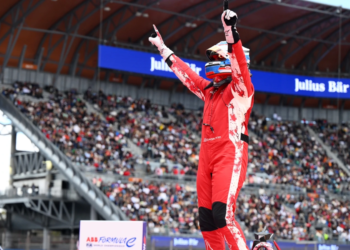The word ‘retire’ was absent. Fernando Alonso left the door ajar indeed for a McLaren return sometime should things improve. But you’d hardly know it. And, as a matter of probability, we have cause for doubt. For him time is not to be denied. We may recall also that previous McLaren pilots Jenson Button and Mika Hakkinen didn’t officially retire when they as good as retired.
It seems we’ve all made our minds up anyway, judging by the flood of reviews of Alonso as man and driver that have followed in the short time since his announcement that he won’t be an F1 driver next year. All have come with an air of finality.
And that’s not the only thing unusual about them. There have been, as we would expect, grand tributes to the undoubted driving skills of the twice world champion. Yet vying with them have been equally familiar lines.
Unfulfilled potential. Tainted legacy. Talent wasted. Flawed. Lost opportunities. Difficult character. Mis-steps. Burnt bridges. Career statistics that don’t do him justice.
That he’d have many more than his two world titles had he not alienated so many people along the way. This, they say, made him near enough unemployable for the top teams in his later years in F1 and consigned him to hopeless equipment. Serves him right.
Well, even parking that it’s a stretch to say being in a two-time champion club alongside Alberto Ascari, Jim Clark, Graham Hill, Emerson Fittipaldi and Mika Hakkinen is a bad thing, one point to make is should we just accept this as received wisdom? The notion that teams won’t employ the best person for a job because they’ve decided dealings with them will be ‘a bit difficult’ strikes me as a rank dereliction of duty rather than received wisdom.
There have been grand tributes to the undoubted driving skills of the twice world champion. Yet vying with them have been equally familiar lines. Unfulfilled potential. Tainted legacy…
Perhaps it’s a matter of my generation, as I grew up with Ayrton Senna, Alain Prost and Nigel Mansell as the driving stars. All were magnificent talents. All were trouble of the highest order. But their teams and those watching on for the most part didn’t clutch pearls, everyone got on with it as they got the job done. F1 it seems changed in the intervening period, and got precious.
But I digress, and in any case I’ve grumbled about this before so I won’t re-tread.
There’s also the point of fine margins. As has also been noted – though it hasn’t impacted many conclusions it seems – with eight points more in the right places Alonso would be a five-time champion rather than two. It wouldn’t have taken much to get that – the odd card falling the other way, such as Romain Grosjean deciding he wasn’t going to drive like a hooligan at Spa’s turn 1 in 2012. And in that scenario the tributes presumably would have a very different slant.
But I’ve digressed again. My main point is that the confident talk of Alonso’s tainted legacies has a fundamental problem. It assumes that F1 legacies are a function of career statistics, and they’re not. Well not necessarily at any rate.
There is a vague influence of course, but by no means is there a direct correlation. If it was we’d never have debates on who the best F1 driver is – we’d just count up the numbers. Michael Schumacher would be unequivocally the greatest ever (this is not to say he isn’t – rather that it’s a point that can be debated). But of course it’s not nearly that simple.
In F1 we have our quintessential example of Stirling Moss, and his zero world championships. It’s a statistic that does not diminish his legacy one scintilla. In a pseudo-Alonso parallel it reflects Moss not being in top-line machinery particularly towards the end of his F1 time, though in Stirling’s case it was due to a distaste for factory teams rather than him falling out with people. I do not recall anyone talking of Stirling’s career in terms of unfulfilled potential and talent wasted.
There also is the case of Chris Amon, his dubious distinction having zero Formula 1 world championship race wins. Another with Alonso parallels, in his case an uncanny ability to make poor career choices including walking out on Ferrari at precisely the wrong moment. Yet Amon’s legacy is stronger than any number of drivers who did see the chequered flag first in F1, including plenty of multiple winners.
The confident talk of Alonso’s tainted legacies has a fundamental problem. It assumes that F1 legacies are a function of career statistics, and they’re not. Well not necessarily at any rate
Then there’s Gilles Villeneuve whose career statistics – six wins; two pole positions – read like those of little more than a solid trier. But of course we know he was much more than that.
More broadly sportspeople from the past get rediscovered and un-discovered all the time and for all sorts of reasons, often which have nothing to do with the sport itself. We can think of how interest in Senna was given a second wind by the Senna film, and how Prost’s legacy was trashed with it. We can think of in football how interest in manager Brian Clough soared with the David Peace book The Damned United and its subsequent film adaptation. Just as often the shifts have nothing to do even with anything that tangible. Sometimes they just happen. Historical legacies are funny things. They can’t often be predicted.
And with this there’s something else the case for the prosecution against Alonso hasn’t considered it seems. That perhaps the ‘missed opportunities’ – and moreover the poignancy that comes with it – actually helps a legacy. It’s not as silly as it might sound – after all, we all love a story of what might have been.
We’ve mentioned Moss and Amon and they indeed are fine examples of this, but we can turn to cricket for perhaps the most apt. Therein Don Bradman is considered beyond contention its finest ever batsman. Some even reckon he’s the best sportsperson ever if it’s measured by what they did versus what anyone else in the same pursuit has managed.
Yet all cricket lovers know the story of Bradman’s test batting average. It’s 99.94. And they also all know that had he scored just four runs in his final test innings he’d have finished with an average of 100+. But he was out for nought.
A matter of regret? Sure – but were his average actually 100 or more would the story be told so often? You could make a case that we’d just say ‘what a great average’ and leave it at that.
There’s another related point too, that there’s been evidence of in recent days indeed. In Alonso we have someone whom we’re now five years on from his last Grand Prix win, yet he still gets so much interest and encourages such fierce debate. That should tell us something. It’s precisely that sort who gets remembered.
One high profile motorsport publication has since the announcement published an article seeking to pick apart the many layers of Alonso’s complex persona; another saying that someone will need to step into F1’s all-important pantomime villain role after he departs. While I’ve no idea what moral is to be drawn with this, it also tells us something. That we don’t half seem to love an anti-hero.
Perhaps the ‘missed opportunities’ – and moreover the poignancy that comes with it – actually helps a legacy. It’s not as silly as it might sound – after all, we all love a story of what might have been
Again it applies in other sports too. In football the wayward, self-destructive sort such as Diego Maradona and George Best get harked back to just as readily – perhaps more readily – as the angelic Pele who made the very best of everything he had. In Maradona’s case you can add that he didn’t always play by the rules. We’ve already mentioned the hardly saintly Clough.
And in F1 we again have our quintessential example, this time in the shape of Senna. Were Senna not the unquietly flawed complex genius, willing to take things beyond the edge, were he instead an upright bastion of rectitude, would we then and now have found him so fascinating? So worthy of exploration?
No Suzuka 1990, no Senna film? It’s possible.
It goes beyond sport too. Orson Welles’ story in film is another often told, doing his best work before he was 30 and all. But say Welles had made Citizen Kane as the last act of his career as a grand crescendo rather than one of his first would we talk about him, and the film, as much? Possibly not.
On this point such reviews of Alonso’s F1 legacy put me in mind of Stephen Fry talking on TV after legendary comedian Peter Cook had passed away (it’s on YouTube if you’re interested). Cook’s career trajectory as it was perceived is another with echoes of Alonso’s – much tangible achievement early (Beyond the Fringe, Not Only…But Also etc) followed by what was thought a lingering, destructive, alienating decline. And as with Alonso the retrospectives for Cook never failed to cover that side of things liberally. Fry though was scathing of the sententious tone adopted.
“Why commentators have to write and talk about extraordinary people as if they’re composing school reports is beyond me – ‘a fair term’s work but Peter must concentrate more on writing stage plays this year…’,” Fry said with contempt.
“’Flawed’? Well I’d be very happy to hear of a list of unflawed human beings. ‘Unrealised potential’ – what does that mean?”
Cook, incidentally, in a ranking by fellow comedians not so long ago was voted as the best ever.
And, again one imagines, the what might have been, the wasted opportunities – it all was part of it.
They say Alonso’s legacy is tainted. I say not so fast.






